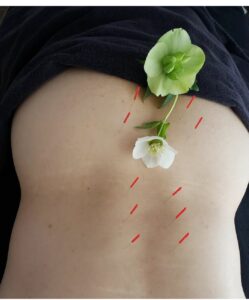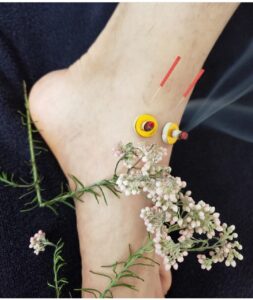痛風
Gout
痛風は、足の親指などの関節が腫れて激しい痛みがでます。男性に多いとされています。この症状は発作的に起こることから痛風発作とも呼ばれます。発作が起こると、歩けないほどの痛みが続きます。痛みは徐々に緩和しますが治療を受けずに放置していると、同じような発作が繰り返し、発作を起こすたびに症状は悪化します。痛風の背後には、高尿酸血症という病気が潜んでいます。高尿酸血症とは、体内でつくられる尿酸が増えすぎてしまった状態です。尿酸は体の新陳代謝により発生する老廃物です。通常、体内の尿酸は産生と排出のバランスを保ちながら、一定の量に保たれています。尿酸が過剰につくられたり、排出がうまくいかなくなったりすると、体内の尿酸は一定量を超えます。血液中の尿酸の濃度が7.0mg/dlを超えた状態が高尿酸血症です。高尿酸血症は、それだけでは自覚症状はでませんが、尿酸濃度が高い状態が続くと、血液に溶け切れなかった尿酸は結晶化して、関節や組織にたまります。尿酸値が高い状態を放置していると、糖尿病や脂質異常症、高血圧を合併しやすくなります。これらの生活習慣病は動脈硬化の最大の危険因子でもあり、複数をあわせもつことによって、狭心症や、心筋梗塞、心疾患、脳出血、脳梗塞などの脳血管疾患を引きき起こす可能性があります。関節だけでなく、腎臓に結晶化した尿酸がたまると、腎臓の機能が低下し、さらに尿酸結晶がたまると、慢性腎不全に陥ることもあります。また、尿酸結晶が尿路にたまると、尿路結石といって腎臓や尿管、膀胱などに結石ができることもあります。痛風の原因となる高尿酸血症は、生活習慣、とくに食生活が大きく関わります。尿酸は「プリン体」が分解されてつくられます。プリン体とは、細胞の新陳代謝やエネルギー代謝によってつくられる物質ですが、食品からもプリン体を摂取しています。プリン体は、レバーやエビなどの動物性食品、アルコール飲料などに多く含まれているので、これらの食品のとりすぎはプリン体のとりすぎになります。さらにアルコールは体内でのプリン体の合成を促し、尿酸の排出を抑制することがわかっています。高カロリー食や多量の飲酒が招く肥満も、痛風の大きな危険因子となります。肥満は尿酸の排出を悪くするため、体内の尿酸量が増えやすくなります。痛風を予防・改善するためには、食べすぎに注意して肥満を改善し、プリン体を多く含む高カロリー食やアルコールを控えることなどが必要です。さらに尿酸の排出を促し、痛風の発作を起こさないために、水分を十分にとることも必要です。適度な運動を行うことも大切です。すでに痛風や高尿酸血症を発症している場合は、激しい運動をしたあと一時的に尿酸値が上がり、痛風発作を起こしやすいので、注意が必要です。激しい運動で大量の汗をかいたときは、体内の尿酸値が一時的に上昇します。このときに水分を十分に補給しないと、血液中の尿酸濃度が上昇したままになり、痛風につながると言われています。今症例では、疼痛緩和を目的に施術しています。足の指、甲など痛みを感じる部位にあるツボを使っています。鍼の鎮痛作用を生かして、疼痛の軽減をはかります。
Gout causes swelling and severe pain in joints such as the toes. It is more common in men. This symptom is also called a gout attack because it occurs in fits and starts. When an attack occurs, the pain is so severe that the patient cannot walk. The pain gradually eases, but if left untreated, similar attacks can recur and the condition worsens with each attack. Behind gout lies a disease called hyperuricemia. Hyperuricemia is a condition in which the amount of uric acid produced by the body has increased too much. Uric acid is a waste product of the body's metabolism. Normally, uric acid in the body is kept at a constant level, maintaining a balance between production and elimination. When excess uric acid is produced or when the elimination of uric acid fails, the amount of uric acid in the body exceeds a certain level. Hyperuricemia is a condition in which the level of uric acid in the blood exceeds 7.0 mg/dl. Hyperuricemia by itself does not cause subjective symptoms, but if the uric acid level remains high, the uric acid that is not fully dissolved in the blood crystallizes and accumulates in joints and tissues. If left untreated, high uric acid levels can easily lead to complications such as diabetes, dyslipidemia, and hypertension. These lifestyle-related diseases are the biggest risk factors for arteriosclerosis, and when combined, can cause angina pectoris, myocardial infarction, heart disease, cerebral hemorrhage, cerebral infarction, and other cerebrovascular diseases. In addition to joint diseases, kidney function is impaired when uric acid crystals accumulate in the kidneys, and further accumulation of uric acid crystals can lead to chronic renal failure. Uric acid crystals can also accumulate in the urinary tract, forming stones in the kidneys, ureters, and bladder, called urinary tract stones. Hyperuricemia, which causes gout, is largely related to lifestyle habits, especially diet. Uric acid is produced when purines are broken down. Purines are substances produced by cell metabolism and energy metabolism, but we also consume purines from food. Since purines are found in animal products such as liver and shrimp, and in alcoholic beverages, too much of these foods can lead to too much purine intake. In addition, alcohol has been shown to promote purine synthesis in the body and inhibit uric acid elimination. Obesity, caused by a high-calorie diet and heavy alcohol consumption, is another major risk factor for gout. Obesity leads to poor uric acid elimination, thus increasing the amount of uric acid in the body. To prevent and improve gout, it is necessary to improve obesity by being careful not to overeat, and to avoid high-calorie diets high in purines and alcohol. It is also necessary to drink plenty of water to promote uric acid elimination and prevent gout attacks. Moderate exercise is also important. If you already have gout or hyperuricemia, your uric acid level will temporarily rise after strenuous exercise, and you are more likely to have a gout attack. When sweating profusely during strenuous exercise, the uric acid level in the body rises temporarily. If the patient does not drink enough water at this time, the uric acid level in the blood will remain elevated, leading to gout. In the present case, the treatment is aimed at pain relief. We use acupuncture points on the toes, instep, and other painful areas. The analgesic effect of acupuncture is utilized to reduce the pain.



